If you followed the Hearts & Minds facebook page (or my own) you know that last weekend we attended the Calvin College Festival of Faith & Music. It may have been the first vacation we’ve had in years and it was just wonderful to be with our good, good friends, Ken & Gail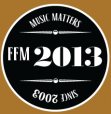 Heffner. Ken and his Student Activities Organization (our daughter Marissa helps out a bit) run this extraordinary conference on pop culture every other year. (In the off years there is this little breathtaking thing known as the Calvin Festival of Faith & Writing.) Just reading through the FFM workshop speakers, topics, and conversations is instructive, not to mention seeing the artists who played, so visit their site, here. It’s the kind of event that many of our BookNotes readers care about, so I figured you’d like to hear about it, the authors who spoke, the books that were discussed (or that should have been, imho.) You follow our bookstore’s work for a reason, and I trust this is one of them. I can’t wait to tell you about it…
Heffner. Ken and his Student Activities Organization (our daughter Marissa helps out a bit) run this extraordinary conference on pop culture every other year. (In the off years there is this little breathtaking thing known as the Calvin Festival of Faith & Writing.) Just reading through the FFM workshop speakers, topics, and conversations is instructive, not to mention seeing the artists who played, so visit their site, here. It’s the kind of event that many of our BookNotes readers care about, so I figured you’d like to hear about it, the authors who spoke, the books that were discussed (or that should have been, imho.) You follow our bookstore’s work for a reason, and I trust this is one of them. I can’t wait to tell you about it…
This year’s FFM was, as always, a heady mix of lectures, workshops, concerts large and small, and some fabulously interesting late night after-parties. What fun to get to hear musicians perform their sets in intimate rooms, artists as diverse as the Soil and the Sun, Care, and, say, Julie Lee and Sarah Mason; and there were bigger shows with Welcome Wagon, Andrew Bird, and Josh Garrels with Mason Jar Music collective. It was so cool crossing paths with Noisetrade founders Derek Webb and Brannon McAllister, her.menutics.com and Christianity Today editor Katelyn Beaty (herself an alum of Calvin.) Being with friends like singer-songwriter (and now author) Justin McRoberts, or Redeemer Presbyterian’s art guru (and harp blowing bluesman) Kenyon Adams, was precious for Beth and I. As Ken Heffner put it, this gathering is a bit unique as participants get to learn and think and reflect, even with scholarly papers, and then also actually experience the very art and music which is being explored. That we did this with wise, Christian leaders and bunches of college-age young adults — the event is held at a college, after all — makes the Festival especially interesting. Never has the interface of theory and praxis been so much fun. Woo-hooo.
Vacation-time is over, though, so I’m back to being the book guy. For our purposes, here, then, allow me to name a few books by the authors who spoke at the festival (forgive me if I miss some) and a handful of other books that are new or important. These will help us as we think as people of Biblical faith about the contemporary music scene.
T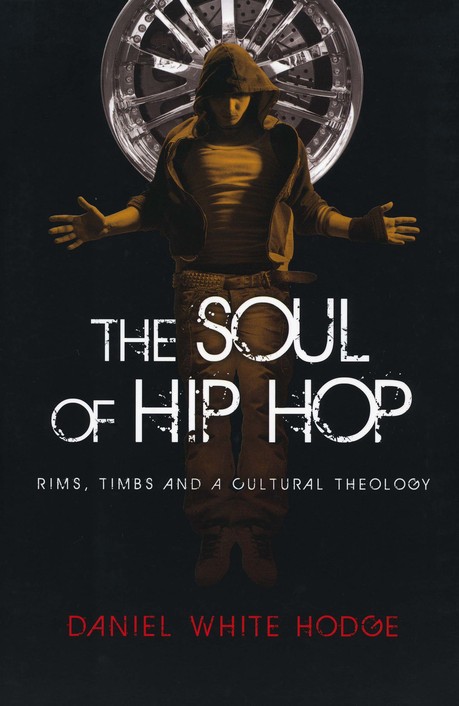 he Soul of Hip Hop: Rims, Timbs and a Cultural Theology Daniel White Hodge (IVP) $17.00 I’ve said this before, but this may be the very best book on hip hop culture and the amazing art form of rap. Hodge is an astute observer, knows the history of the style, and – thank goodness, for a book like this! – enjoys it. His presentation the first night of the Calvin Festival was riveting, bold and passionate, well beyond a surface look, engaged with the passion of a devotee and evangelist. He wanted us to get it, to appreciate the lyrical power and social themes of the prophetic imagination emerging from the often disenfranchised artists who have shaped this genre. This is radical, Biblical reflection, and his book deserves to be known, read, considered. Certainly if you know young adults who like hip hop you should tell them about this book. We have a few others, but this is the best. Kudos to Calvin for once again hosting this good brother.
he Soul of Hip Hop: Rims, Timbs and a Cultural Theology Daniel White Hodge (IVP) $17.00 I’ve said this before, but this may be the very best book on hip hop culture and the amazing art form of rap. Hodge is an astute observer, knows the history of the style, and – thank goodness, for a book like this! – enjoys it. His presentation the first night of the Calvin Festival was riveting, bold and passionate, well beyond a surface look, engaged with the passion of a devotee and evangelist. He wanted us to get it, to appreciate the lyrical power and social themes of the prophetic imagination emerging from the often disenfranchised artists who have shaped this genre. This is radical, Biblical reflection, and his book deserves to be known, read, considered. Certainly if you know young adults who like hip hop you should tell them about this book. We have a few others, but this is the best. Kudos to Calvin for once again hosting this good brother.
S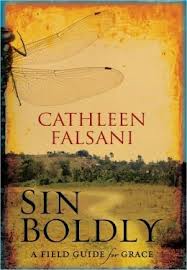 in Boldly: A Field Guide for Grace Cathleen Falsini (Zondervan) $19.99 I adore this book and it was so wonderful hearing Ms Falsini again. It was, in fact, deeply moving – Beth and I fought back tears when she played “Born at the Right Time” from Paul Simon’s Rhythm of the Saints as she talked about adopting her son from Malawi. And I got choked up when she told about her travels with Bono while playing a post 9-11 live video version of one of the many U2 songs that helped so many of us cope after that tragedy. Falsani has written before about the first time she heard the first single from Mumford & Sons new album, Babel, as she was on her way to be with her dying father. So, she certainly did a marvelous job, as she does in Sin Boldly, finding glimpses of grace all over the world, in the good and the bad, in politics and poverty and film and rock and roll. Her other books include the wonderfully curious The Dude Abides: The Gospel According to the Coen Brothers (Zondervan; $14.99) and -okay, I’ll just say it, Belieber: Fame, Faith, and the Heart of Justin Beiber (Worthy; $16.99.) As she said, offhandedly, “Lord have mercy, we should pray for that little boy.” Cathleen Falsani is an excellent writer and you should read her books.
in Boldly: A Field Guide for Grace Cathleen Falsini (Zondervan) $19.99 I adore this book and it was so wonderful hearing Ms Falsini again. It was, in fact, deeply moving – Beth and I fought back tears when she played “Born at the Right Time” from Paul Simon’s Rhythm of the Saints as she talked about adopting her son from Malawi. And I got choked up when she told about her travels with Bono while playing a post 9-11 live video version of one of the many U2 songs that helped so many of us cope after that tragedy. Falsani has written before about the first time she heard the first single from Mumford & Sons new album, Babel, as she was on her way to be with her dying father. So, she certainly did a marvelous job, as she does in Sin Boldly, finding glimpses of grace all over the world, in the good and the bad, in politics and poverty and film and rock and roll. Her other books include the wonderfully curious The Dude Abides: The Gospel According to the Coen Brothers (Zondervan; $14.99) and -okay, I’ll just say it, Belieber: Fame, Faith, and the Heart of Justin Beiber (Worthy; $16.99.) As she said, offhandedly, “Lord have mercy, we should pray for that little boy.” Cathleen Falsani is an excellent writer and you should read her books.
S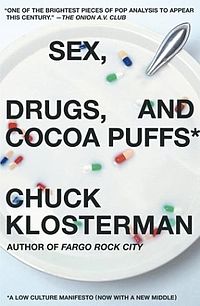 ex, Drugs, and Cocoa Puffs: A Low Culture Manifesto Chuck Klosterman (Scribner) $15.00 Many participants adored this edgy, Gen X writer, one of the more popular novelists and essayists of his generation, as he rambled through a hip talk pondering what in the world he was doing at a conference on religion and rock music. Well, for starters, his novels are packed full of references to religion and music, and his collections of essays -fun, profane, pushy, witty, insightful – sometimes tackle the topic directly. (Chuck K is a sports writer, too, and his journalism there is also highly regarded among those who favor a certain informal, provocative style. In his talk he dismissed the recent pundit who compared him to Hunter S. Thompson but to even have to do that, well, ’nuff said.) Okay, so, anyway, he wondered how he got himself into this gig.
ex, Drugs, and Cocoa Puffs: A Low Culture Manifesto Chuck Klosterman (Scribner) $15.00 Many participants adored this edgy, Gen X writer, one of the more popular novelists and essayists of his generation, as he rambled through a hip talk pondering what in the world he was doing at a conference on religion and rock music. Well, for starters, his novels are packed full of references to religion and music, and his collections of essays -fun, profane, pushy, witty, insightful – sometimes tackle the topic directly. (Chuck K is a sports writer, too, and his journalism there is also highly regarded among those who favor a certain informal, provocative style. In his talk he dismissed the recent pundit who compared him to Hunter S. Thompson but to even have to do that, well, ’nuff said.) Okay, so, anyway, he wondered how he got himself into this gig.
Way to go, Calvin College SOA, for inviting this somewhat controversial guest into our conversation, for allowing us to (again) find insight from various quarters. One of the great 19th century disciples of John Calvin was Abraham Kuyper, and it is Kuyper’s sort of neo-Calvinism that animates Calvin College and the Festival with its blessed, if a bit dangerous, commitment to living into the themes of common grace. The phrase “Common grace for the common good” often is applied to politics, how we should draw on all manner of gifts and insights to build a public square that is just for all. At FFM such nods to common grace, also for the common good, means be willing to hear and engage the gifts of art, music, and cultural criticism, no matter from where it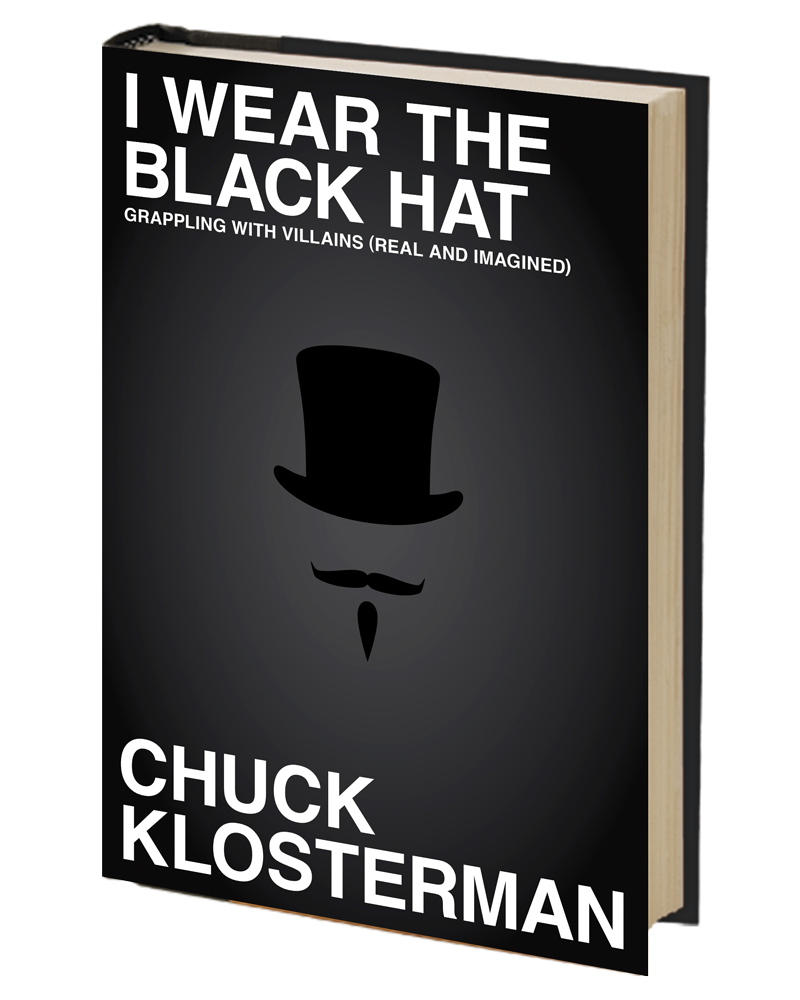 comes.
comes.
By the way, Klosterman told us his next book is a study of evil, by way of lo
oking at literary and film villains. Philosophy, lit crit, pop culture and a heckuva creative prose style will combine to give us a great book, I’m sure. I Wear the Black Hat: Grappling with Villains (Real and Imagined) will release early June 2013. It will be a hardback, selling for $25.00. Let us know if you want to pre-order it (at the 20% BookNotes discount.)
R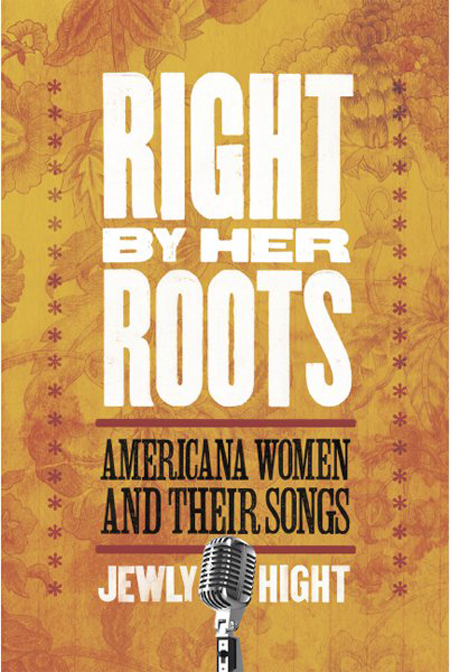 ight By Her Roots: Americana Women and Their Songs Jewly Hight (Baylor University Press) $24.95 I really intended to catch this workshop, but the schedule didn’t permit. So glad we have had the book on our shelves for a year. I’ve read a few of these good chapters (about Julie Miller, Victoria Williams, Michelle Shocked) and will now read more. One reviewer said when it came out that it “will end up being the best book written about American music this year” FFM speaker David Dark invites us to be enriched saying, “With a powerful wit, intense attentiveness, and eloquent empathy, Jewly Hight is a dream come true for the songwriters to whom she pays careful and affectionate heed. By calling our attention to them, she lifts their voices, testifying concerning the ways their work uplifts, invigorates, and challenges our otherwise all-too-settled imaginations.”
ight By Her Roots: Americana Women and Their Songs Jewly Hight (Baylor University Press) $24.95 I really intended to catch this workshop, but the schedule didn’t permit. So glad we have had the book on our shelves for a year. I’ve read a few of these good chapters (about Julie Miller, Victoria Williams, Michelle Shocked) and will now read more. One reviewer said when it came out that it “will end up being the best book written about American music this year” FFM speaker David Dark invites us to be enriched saying, “With a powerful wit, intense attentiveness, and eloquent empathy, Jewly Hight is a dream come true for the songwriters to whom she pays careful and affectionate heed. By calling our attention to them, she lifts their voices, testifying concerning the ways their work uplifts, invigorates, and challenges our otherwise all-too-settled imaginations.”
E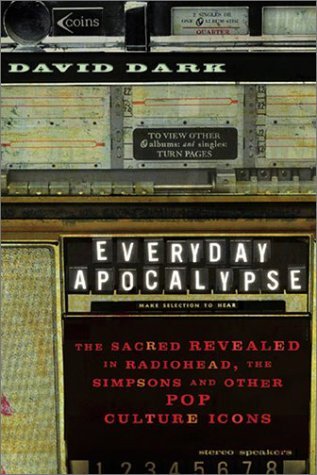 veryday Apocalypse: The Sacred Revealed in Radiohead, the Simpsons, and other Pop Culture Icons David Dark (Brazos) $18.00 What can I say? Being with David is itself a bit of performance art; he’s a genius, a wordsmith, and a dear, dear, loyal friend to many. He has written several other books, all of which we commend (and, in fact, I’ve got an endorsing blurb on one of them, an honor I did not take lightly.) Pop culture fans young and old, artists, filmmakers, writers, and thought leaders in this whole arena (like FFM’s Ken Heffner) will regularly say that David Dark is one of their best supporters and his book truly seminal. No one can talking knowingly about this topic without having read Everyday Apocalypse; it is that important. If you are interested and into this topic and haven’t read this amazingly rich, mind-blowing work, treat yourself and be prepared to have your world rocked. Really.
veryday Apocalypse: The Sacred Revealed in Radiohead, the Simpsons, and other Pop Culture Icons David Dark (Brazos) $18.00 What can I say? Being with David is itself a bit of performance art; he’s a genius, a wordsmith, and a dear, dear, loyal friend to many. He has written several other books, all of which we commend (and, in fact, I’ve got an endorsing blurb on one of them, an honor I did not take lightly.) Pop culture fans young and old, artists, filmmakers, writers, and thought leaders in this whole arena (like FFM’s Ken Heffner) will regularly say that David Dark is one of their best supporters and his book truly seminal. No one can talking knowingly about this topic without having read Everyday Apocalypse; it is that important. If you are interested and into this topic and haven’t read this amazingly rich, mind-blowing work, treat yourself and be prepared to have your world rocked. Really.
P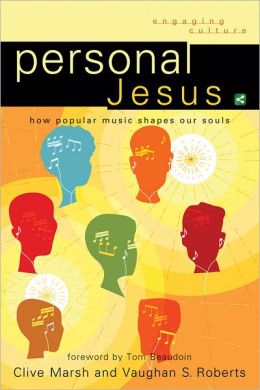 ersonal Jesus: How Popular Music Shapes Our Souls Clive Marsh & Vaughan S. Roberts (Baker Academic) $22.99 It was a delight to meet Vaughan (who gave an outstanding, research-based workshop) and to chat with some of his editorial staff at Baker who do so many good books in this series – what a fascinating gentleman scholar who is doing such fine work! Yes, this book is a bit academic (and yes, the cover is, uh, well, you know.) But at its heart is something basic, something passionate, something nearly primal: how does listening to music effect us? Is it a religious experience and if so, how? What do people say when asked? What is going on here? (And, is it the lyric, mostly, or the music itself?) This is a very serious, and I think groundbreaking rumination on how popular music works, the role it plays for listeners, and the phenomenon of its popularity. It really does have a missional edge, asking how we as Christians might engage the music itself, more faithfully, and with awareness of why we and our neighbors are influenced as we are by the music we love.
ersonal Jesus: How Popular Music Shapes Our Souls Clive Marsh & Vaughan S. Roberts (Baker Academic) $22.99 It was a delight to meet Vaughan (who gave an outstanding, research-based workshop) and to chat with some of his editorial staff at Baker who do so many good books in this series – what a fascinating gentleman scholar who is doing such fine work! Yes, this book is a bit academic (and yes, the cover is, uh, well, you know.) But at its heart is something basic, something passionate, something nearly primal: how does listening to music effect us? Is it a religious experience and if so, how? What do people say when asked? What is going on here? (And, is it the lyric, mostly, or the music itself?) This is a very serious, and I think groundbreaking rumination on how popular music works, the role it plays for listeners, and the phenomenon of its popularity. It really does have a missional edge, asking how we as Christians might engage the music itself, more faithfully, and with awareness of why we and our neighbors are influenced as we are by the music we love.
As Brett McCracken writes in the forward “Personal Jesus is one of the best theological treatments of pop culture I have ever read. Marsh & Roberts offer a many-layered, comprehensive model for how we can more thoughtfully understand and engage pop music.” Or, as Catholic Gen X scholar Tom Beaudoin (Virtual Faith) writes, “Marsh & Roberts prepare the way for a new style of making theological sense of popular culture… they show us why studying the lived experience of popular music is an imperative if we want to find out where religion cohabitates with ordinary stuff, more or less openly, today: in the spaces of meaning communicated by music in everyday life.” Roberts is a Vicar of Collegiate Church in Warwick, England. I hope this book is bought and studied, discussed and taught.
B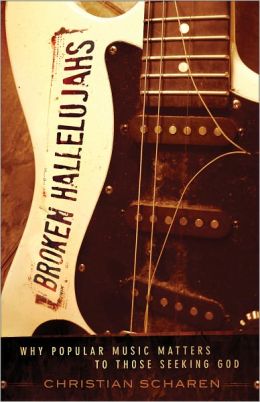 roken Hallelujahs: Why Popular Music Matters to Those Seeking God Christian Scharen (Baker) $18.00 I love this book, and really appreciate the work of this excellent author. (Scharen used to be at the Center for Faith and Culture at Yale Divinity School, but now teaches worship and theology at Luther Seminary in St. Paul.) I’ve reviewed it before, so for how, here’s what it says on the back cover: “Building on the success of One Step Closer: Why U2 Matters to Those Seeking God, Christian Scharen shows how to engage faith and culture through a wide range of popular music, including the blues, hip-hop, and rock. He examines artists such as Arcade Fire, Kanye West, Leonard Cohen, and Billie Holiday, offering a fresh, compelling theology of culture in conversation with C. S. Lewis that can look suffering and brokenness in the face because it knows of a love deeper than hate, a hope stronger than despair. Written engagingly yet with theological depth, this book will resonate with readers interested in the interface between pop culture, music, and theology, as well as with pastors and youth ministers.”
roken Hallelujahs: Why Popular Music Matters to Those Seeking God Christian Scharen (Baker) $18.00 I love this book, and really appreciate the work of this excellent author. (Scharen used to be at the Center for Faith and Culture at Yale Divinity School, but now teaches worship and theology at Luther Seminary in St. Paul.) I’ve reviewed it before, so for how, here’s what it says on the back cover: “Building on the success of One Step Closer: Why U2 Matters to Those Seeking God, Christian Scharen shows how to engage faith and culture through a wide range of popular music, including the blues, hip-hop, and rock. He examines artists such as Arcade Fire, Kanye West, Leonard Cohen, and Billie Holiday, offering a fresh, compelling theology of culture in conversation with C. S. Lewis that can look suffering and brokenness in the face because it knows of a love deeper than hate, a hope stronger than despair. Written engagingly yet with theological depth, this book will resonate with readers interested in the interface between pop culture, music, and theology, as well as with pastors and youth ministers.”
Don’t Stop Believin’: Popular Culture and Religion from Ben Hur to Zombies edited by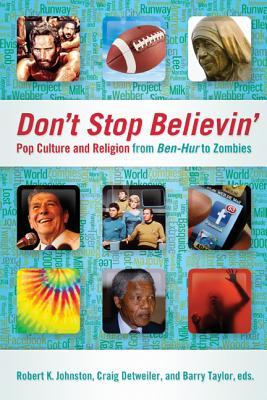 Robert K. Johnston, Craig Detweiler, and Barry Taylor (Westminster/John Knox) $20.00 I hope you know these authors, who form nearly an entire school of thought in this whole area of study. Each have written thoughtful books on film, music, entertainment, digital culture, media and the popular arts. Together, now, they’ve edited a fine collection of mature essays on hundreds and hundreds of topics. Don’t Stop… can be used as a conversation starter, as background for deeper thinking, or to dip in to whenever you have a spare moment or two (but be aware, it can be addicting!) Skip to pedestrian cover and dive right in — this is good, good content! Read succinct insights about the Beatles, the significance of Star Trek, the meaning of Dr. Who, making sense of South Park, the aesthetics of Andy Warhol, the role of Calvin Klein and Nike ads, the theological significance of SimCity.
Robert K. Johnston, Craig Detweiler, and Barry Taylor (Westminster/John Knox) $20.00 I hope you know these authors, who form nearly an entire school of thought in this whole area of study. Each have written thoughtful books on film, music, entertainment, digital culture, media and the popular arts. Together, now, they’ve edited a fine collection of mature essays on hundreds and hundreds of topics. Don’t Stop… can be used as a conversation starter, as background for deeper thinking, or to dip in to whenever you have a spare moment or two (but be aware, it can be addicting!) Skip to pedestrian cover and dive right in — this is good, good content! Read succinct insights about the Beatles, the significance of Star Trek, the meaning of Dr. Who, making sense of South Park, the aesthetics of Andy Warhol, the role of Calvin Klein and Nike ads, the theological significance of SimCity.
There are interesting pieces of culture-shaping events like the Super Bowl and on artifacts like the iPod and a good reflection on the impact of Facebook.
Of course there are entries on influential writers in the field such as Marshal McLuhen. Naturally, there are pieces on classic musicians like Dylan, Marvin Gaye, Madonna, and Bob Marley and on filmmakers such as Woody Allen and Quentin Tarantino. There is a lovely piece on Les Mis, and good ones on pop icons such as Mary
Tyler Moore.
This remarkable reference guide is arranged chronologically from the 1950s – Johnny Cash shows up here, as does C.S. Lewis, and Mickey Mantle and Marilyn Monroe – and ends with the 2000s. This last section includes dozens of entries, including Bansky, The Daily Show, Lost, Project Runway, Twilight, Wicked, World of Warcraft and more.
The pieces are succinct and informative; a few are nearly sublime. And, often, the connection of topic and author is itself quite fabulous: Lauren Winner on Mitford, David Dark on Amy Grant, Steve Turner on the Beatles, Jana Riess on Buffy the Vampire Slayer, Gareth Higgins on Desomd Tutu, Daniel White Hodge on Tupac Amaru Shakur, Mark Pinsky, of course, on The Simpsons. From contributions by sports writers to those exploring influential ad campaigns, from ruminations on socially-significant literature to the popular impact of certain political figures, this really is a glimpse into the making of the contemporary Western (and, increasingly, global) imagination. It is well worth your time to read these, bit by bit. Enjoy!
There is a tremendous introduction, by the way, and the epilogue is equally fantastic, inviting us all into “The Mystery Discerning Business.” If you know this growing field of study, the interface of faith and popular culture, you know you want this. If you don’t (preachers? teachers?) perhaps it will bring you up to speed on how to think about the stuff so many of your neighbors take for granted.
T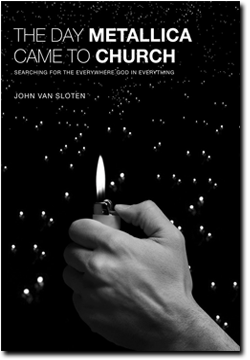 he Day Metallica Came to Church: Searching for the Everywhere God in Everything John Van Sloten (Faith Alive/Square Inch) $14.99 Although the lead-off Metallica piece here really is a fine, fine essay, this isn’t a book about heavy metal music; it isn’t even a book about music in the church, really, at all. It is a book about popular culture, about how to find the presence of God — “the everywhere God” — in all sorts of places, artifacts, experiences. This is the kind of book you can enjoy by dipping in almost anywhere: a piece on No Country for Old Men, perhaps? “Common Grace in The Dark Knight“? A reflection on Van Gogh? Race relations explored Christianly by way of the movie Crash? Yes, yes, yes, you can enjoy these, use them in classes, ponder them so that you might deepen your own cultural discernment skills. John Van Sloten is my kind of guy — he loves U2, he is able to talk theology, and he exhibits a wide reading/listening/viewing pallet. And he’s mostly quite right about all this: as Richard Mouw writes, “Don’t go — or refuse to go! — to another rock concert or soccer match without first reading this marvelous book. It is a reliable and inspiring guide to hearing the Lord speak to us in new and exciting places.”
he Day Metallica Came to Church: Searching for the Everywhere God in Everything John Van Sloten (Faith Alive/Square Inch) $14.99 Although the lead-off Metallica piece here really is a fine, fine essay, this isn’t a book about heavy metal music; it isn’t even a book about music in the church, really, at all. It is a book about popular culture, about how to find the presence of God — “the everywhere God” — in all sorts of places, artifacts, experiences. This is the kind of book you can enjoy by dipping in almost anywhere: a piece on No Country for Old Men, perhaps? “Common Grace in The Dark Knight“? A reflection on Van Gogh? Race relations explored Christianly by way of the movie Crash? Yes, yes, yes, you can enjoy these, use them in classes, ponder them so that you might deepen your own cultural discernment skills. John Van Sloten is my kind of guy — he loves U2, he is able to talk theology, and he exhibits a wide reading/listening/viewing pallet. And he’s mostly quite right about all this: as Richard Mouw writes, “Don’t go — or refuse to go! — to another rock concert or soccer match without first reading this marvelous book. It is a reliable and inspiring guide to hearing the Lord speak to us in new and exciting places.”
L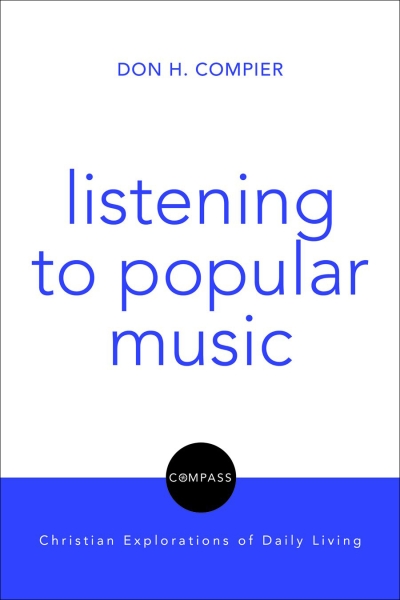 istening to Popular Music (Compass Guides to Christian Explorations of Daily Living) Don H. Compier (Augsburg) $15.00 I have commended this series of books before, and glad that they’ve now included this great topic alongside the others (such as Clothing, Shopping, Eating and Drinking, Play, Parenting, Work.) Compier could have presented a scholarly paper at the FFM, for sure, as his general effort is consistent with their discerning “common grace for the common good” project, and he takes up the gifts of pop music in thoughtful, faith-informed, sociologically-astute ways. His style at times, especially in a chapter about the fear of music in church history, illustrates his role as a theological thinker of mainline Protestant orientation. Still, this is a solid, interesting, brief, contribution to this whole project. Compier is dean and professor of theology at Community of Christ Seminary at Graceland University in Independence Missouri. Another book he wrote is What is Rhetorical Theology: Textual Practice and Public Discourse — this one, gladly, isn’t laden with that kind of arcane rhetoric. He does cite some fairly contemporary singers (Death Cab; Lady Gaga, Green Day, Rage Against the Machine) but as he explains, he’s been a rock and roll fan all of his boomer life. So he digs the the Beatles and Springsteen and Los Lobos and Aretha Franklin and Johnny Cash; even the Dead! And he writes about them alongside Augustine, Calvin, Wesley, and James Cone. No matter your musical tastes, he has given us some important, serious stuff, here, a method for thinking intentionally about popular arts. Like the others in the series, it is well worth reading.
istening to Popular Music (Compass Guides to Christian Explorations of Daily Living) Don H. Compier (Augsburg) $15.00 I have commended this series of books before, and glad that they’ve now included this great topic alongside the others (such as Clothing, Shopping, Eating and Drinking, Play, Parenting, Work.) Compier could have presented a scholarly paper at the FFM, for sure, as his general effort is consistent with their discerning “common grace for the common good” project, and he takes up the gifts of pop music in thoughtful, faith-informed, sociologically-astute ways. His style at times, especially in a chapter about the fear of music in church history, illustrates his role as a theological thinker of mainline Protestant orientation. Still, this is a solid, interesting, brief, contribution to this whole project. Compier is dean and professor of theology at Community of Christ Seminary at Graceland University in Independence Missouri. Another book he wrote is What is Rhetorical Theology: Textual Practice and Public Discourse — this one, gladly, isn’t laden with that kind of arcane rhetoric. He does cite some fairly contemporary singers (Death Cab; Lady Gaga, Green Day, Rage Against the Machine) but as he explains, he’s been a rock and roll fan all of his boomer life. So he digs the the Beatles and Springsteen and Los Lobos and Aretha Franklin and Johnny Cash; even the Dead! And he writes about them alongside Augustine, Calvin, Wesley, and James Cone. No matter your musical tastes, he has given us some important, serious stuff, here, a method for thinking intentionally about popular arts. Like the others in the series, it is well worth reading.
P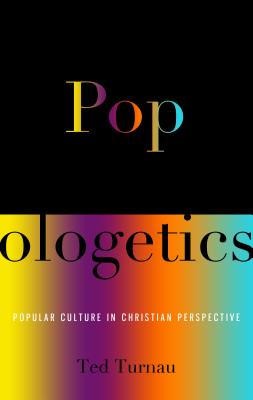 opologetics: Popular Culture in Christian Perspective Ted Turnau (Presbyterian & Reformed) $19.99 If I had been selling books at this event, I’d have had this on a double-decker book stand, featured and promoted. In part, I’d do it just to be ornery, since this author calls us to be a bit more concerned about the possible negative influences of pop culture, and such “Christ against culture” themes (or, better, what Kuyper called “the antithesis”) isn’t discussed much at FFM. But I’d be being sincere, too, as this really is a great book, and those attending the conference surely would benefit from it. Despite the quirky title, Popologetics is a profound, serious, important, and — at times — exquisitely exciting study, inviting us to really dig deep into the “in the world but not of it” teaching of Jesus. Just so you know how very good this is, read this short review by our good friend (and pop music lover) Denis Haack, from his lovely, wise journal, Critique. Further, Bill Edgar of Westminster Theological Seminary says it is a “tour de force…there is nothing remotely like it in print today.” A senior editor at IVP UK writes, “This is one of the freshest and most original books I have read in ages.” At 368 pages, this isn’t a simple, breezy read, but it is one you should commit yourself to work through, sooner than later.
opologetics: Popular Culture in Christian Perspective Ted Turnau (Presbyterian & Reformed) $19.99 If I had been selling books at this event, I’d have had this on a double-decker book stand, featured and promoted. In part, I’d do it just to be ornery, since this author calls us to be a bit more concerned about the possible negative influences of pop culture, and such “Christ against culture” themes (or, better, what Kuyper called “the antithesis”) isn’t discussed much at FFM. But I’d be being sincere, too, as this really is a great book, and those attending the conference surely would benefit from it. Despite the quirky title, Popologetics is a profound, serious, important, and — at times — exquisitely exciting study, inviting us to really dig deep into the “in the world but not of it” teaching of Jesus. Just so you know how very good this is, read this short review by our good friend (and pop music lover) Denis Haack, from his lovely, wise journal, Critique. Further, Bill Edgar of Westminster Theological Seminary says it is a “tour de force…there is nothing remotely like it in print today.” A senior editor at IVP UK writes, “This is one of the freshest and most original books I have read in ages.” At 368 pages, this isn’t a simple, breezy read, but it is one you should commit yourself to work through, sooner than later.
I didn’t get to sell it at the event, so I’m prentending now: “Hey, hi — uh, didja see this one? Man, it’s good – check it out. A little tougher than some, but, you know, we need to think about this stuff, really. Yeah, yeah, I know, it isn’t as funny as that Klosterman your looking at. No, it isn’t just about music. Yeah, I know, it’s thick. Yep, I’ve read it.” (Aside, under my breath: “Well, most of it, anyway.”) “And look at these killer quotes on the back. This dude says it is a freakin’ tour de force! That’s gotta be good, right?” Well, yes, thanks. And it’s on sale, too. Thank you. Hope you find it helpful.”
There. All weekend at FFM I was wanting to do that.
E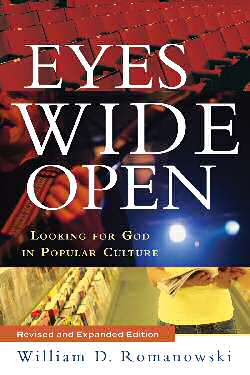 yes Wide Open: Looking for God in Popular Culture William D. Romanowski (Brazos Press) $23.00 This is surely one of the best books in this field, doubtlessly a watershed work, esteemed and cited by everybody in the field. If you follow BookNotes or visit the shop, you may recall
yes Wide Open: Looking for God in Popular Culture William D. Romanowski (Brazos Press) $23.00 This is surely one of the best books in this field, doubtlessly a watershed work, esteemed and cited by everybody in the field. If you follow BookNotes or visit the shop, you may recall
me saying this before — it’s a book I love to tell people about, and not a few have thanked me for doing so! Did I mention how much I love this author, as a very old friend and a very good scholar? Or that he teaches, also at Calvin College, home of the FFM? (But used to work for the CCO near Pittsburgh?) This second (expanded) edition has a bit more material in it about film than music, but the worldviewish and cultural studies frame he uses to allow us to discern idols and ideologies, and appreciate goodness and grace, in all kinds of popular artifacts, remains unparallelled. Not even a short list like this would be complete without naming Eyes Wide Open. Very, very nicely done.
AND ANNOUNCING: YOU CAN PRE-ORDER
It Was Good: Making Music to the Glory of God edited by Ned Bustard (Square Halo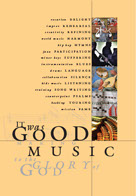 Books) $24.99 Not Yet Released; due late summer/early fall 2013 It is a bit early to promote this, perhaps, and you can be sure I’ll do a thorough discussion of it when it releases later this year. I’ve read much of it already in early drafts, and, like its earlier, spectacular, must-have companion volume, It Was Good: Making Art to the Glory of God (also edited by Bustard and published by Square Halo Books; $24.99 ) it is truly, exceptionally fantastic. There is no other volume like this, that’s for sure!
Books) $24.99 Not Yet Released; due late summer/early fall 2013 It is a bit early to promote this, perhaps, and you can be sure I’ll do a thorough discussion of it when it releases later this year. I’ve read much of it already in early drafts, and, like its earlier, spectacular, must-have companion volume, It Was Good: Making Art to the Glory of God (also edited by Bustard and published by Square Halo Books; $24.99 ) it is truly, exceptionally fantastic. There is no other volume like this, that’s for sure!
This forthcoming anthology has original pieces on all kinds of music (from jazz to blues to rock to hymnody) and explores many aspects of music (with good chapters on listening, on technical stuff by producers, even a truly wonderfully-rendered piece on booking and promotion by one of the former staff of the Calvin College SAO who produces the FFM.) IWG:MM includes contributions by some well-known people (including, for instance, a piece on modern hymnody, by Keith Getty (who wrote In Christ Alone), one on songwriting by Welcome Wagon’s Vito Aiuto who preformed at FFM, a chapter by prestigious Grammy Award-winning jazz bassist John Patitucci on improvisation and one notable one on collaboration by the very cool Michael Roe of 77s fame.) Some chapters are by folks I know and respect (Joy Ike, Sandra McCraken, Charlie Peacock) and many are from authors I do not know. There are some neato surprises (Brian Moss on silence, Stephen Nichols on fame, Mark Foreman, father of the Switchfoot boys, on training, Katie Bowser on kids music.)
I won’t spill all the beans now, but you get the drift. This is awesome. You can pre-order it from us now if you’d like at our BookNotes 20% off.
BookNotes
SPECIALDISCOUNTANY ITEM MENTIONED
20% off
order heretakes you to the secure Hearts & Minds order form pagejust tell us what you want
inquire here
if you have questions or need more information
just ask us what you want to know
Hearts & Minds 234 East Main Street Dallastown, PA 17313 717-246-3333
read@heartsandmindsbooks.com
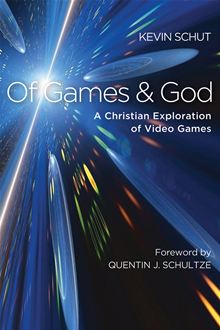 of Video Games by Kevin Schut [Baker; $17.99]) to our section on media ecology, from books on film to books on theater, we love sharing these sorts of resources. And especially books about good old rock and roll. Do you know the 33 1/3 books, for instance, published by Bloomsbury, each which examine a particularly interesting and often quite important rock album? We stock a lot of them and think they’re pretty cool.
of Video Games by Kevin Schut [Baker; $17.99]) to our section on media ecology, from books on film to books on theater, we love sharing these sorts of resources. And especially books about good old rock and roll. Do you know the 33 1/3 books, for instance, published by Bloomsbury, each which examine a particularly interesting and often quite important rock album? We stock a lot of them and think they’re pretty cool.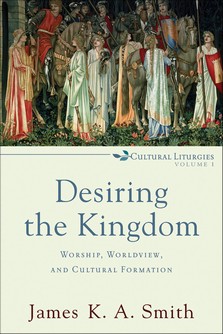 his notion. We are shaped and formed by the stuff we engage in. Read Jamie Smith’s essential Desiring the Kingdom: Worship, Worldview, and Cultural Formation (Baker; $21.99) to be reminded of this in quite sophisticated terms; see Walt Mueller’s How to Use Your Head to Guard Your Heart: A 3(D) Guide to Making Responsible Media Choices over at CPYU for an easy to apply process for talking about this with teens in pretty simple terms. Although it is not just on the popular arts, I love Walt’s important book Engaging the Soul of Youth Culture: Bridging Teen Worldviews and Christian Truth published by IVP; $18.00) which certainly is
his notion. We are shaped and formed by the stuff we engage in. Read Jamie Smith’s essential Desiring the Kingdom: Worship, Worldview, and Cultural Formation (Baker; $21.99) to be reminded of this in quite sophisticated terms; see Walt Mueller’s How to Use Your Head to Guard Your Heart: A 3(D) Guide to Making Responsible Media Choices over at CPYU for an easy to apply process for talking about this with teens in pretty simple terms. Although it is not just on the popular arts, I love Walt’s important book Engaging the Soul of Youth Culture: Bridging Teen Worldviews and Christian Truth published by IVP; $18.00) which certainly is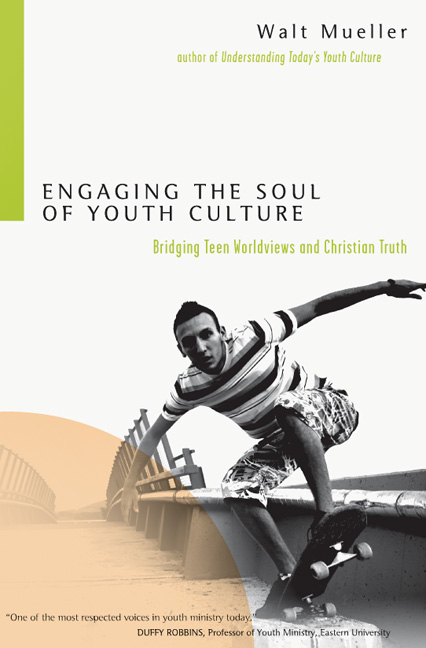 relevant here.
relevant here.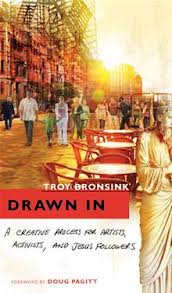 rawn In: A Creative Process for Artists, Activists, and Jesus Followers Troy Bronsink (Paraclete) $16.99 Troy is a Presbyterian pastor, indie musician, street activist and faith-based organizer and he has here given us a tremendously cool book, full of substance and verve, theology and vision, hope and healing. If you are an artist, patron, fan, or simply a person wanting to learn how to be more imaginative, this guide is hard to beat. What a great title (and cover, too, eh?) Love it.
rawn In: A Creative Process for Artists, Activists, and Jesus Followers Troy Bronsink (Paraclete) $16.99 Troy is a Presbyterian pastor, indie musician, street activist and faith-based organizer and he has here given us a tremendously cool book, full of substance and verve, theology and vision, hope and healing. If you are an artist, patron, fan, or simply a person wanting to learn how to be more imaginative, this guide is hard to beat. What a great title (and cover, too, eh?) Love it.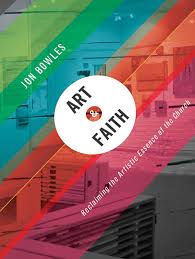 rt + Faith: Reclaiming the Artistic Essence of the Church Jon Bowles (House Studio) book $12.99; DVD $36.99 This is a small, nifty book that could be read on its own, but I suppose is designed to go with the DVD curriculum of the same name. It is not a “participants guide” or simplistic workbook, though, but a real book that certainly invites great imagination. Informed by the narrative of the Beggars Table,a community that meets in a gallery in Kansas City’s art district. This is not about “arts programming” but, not unlike the Bronsink book above, it really is more about helping all of us appreciate the arts, engage in meaning-making by being formed in disciplines of seeing. This is a story, they say, of “how art has shaped the imagination of one church toward the Kingdom. This could be a story about your church, too.” I like this study of mystery (and our “mystery deprived world) and beauty and awe, and the necessary relationship of faith, religion, art and wonder
rt + Faith: Reclaiming the Artistic Essence of the Church Jon Bowles (House Studio) book $12.99; DVD $36.99 This is a small, nifty book that could be read on its own, but I suppose is designed to go with the DVD curriculum of the same name. It is not a “participants guide” or simplistic workbook, though, but a real book that certainly invites great imagination. Informed by the narrative of the Beggars Table,a community that meets in a gallery in Kansas City’s art district. This is not about “arts programming” but, not unlike the Bronsink book above, it really is more about helping all of us appreciate the arts, engage in meaning-making by being formed in disciplines of seeing. This is a story, they say, of “how art has shaped the imagination of one church toward the Kingdom. This could be a story about your church, too.” I like this study of mystery (and our “mystery deprived world) and beauty and awe, and the necessary relationship of faith, religion, art and wonder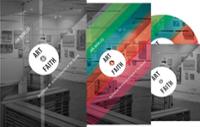 .
.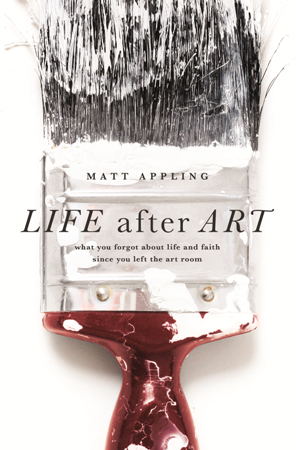 ife After Art: What You Forgot About Life and Faith Since You Left the Art Room Matt Appling (Moody Press) $13.99 I am excited about this new imprint of books published by the stalwart evangelical house called Moody Collective. This tremendous book is a great new kind of book for Moody, it seems, young, creative, fresh, interesting for those who need something other than standard basic Christian growth or self-help books, or mere theology (as helpful as all that can be.) This book invites us to realize that we are creative people, we make things (for better or worse) so we might as well, as Appling says, do it on purpose. He wonders how we lost our confidence to create, crumbling under the pressure of the so-called “real, grown-up world.” Appling is an art teacher, having worked with pre-K through high school, in fact. This is a hopeful book, fun and a bit challenging. Has something been lost along the way, for you? This will help you get it back!
ife After Art: What You Forgot About Life and Faith Since You Left the Art Room Matt Appling (Moody Press) $13.99 I am excited about this new imprint of books published by the stalwart evangelical house called Moody Collective. This tremendous book is a great new kind of book for Moody, it seems, young, creative, fresh, interesting for those who need something other than standard basic Christian growth or self-help books, or mere theology (as helpful as all that can be.) This book invites us to realize that we are creative people, we make things (for better or worse) so we might as well, as Appling says, do it on purpose. He wonders how we lost our confidence to create, crumbling under the pressure of the so-called “real, grown-up world.” Appling is an art teacher, having worked with pre-K through high school, in fact. This is a hopeful book, fun and a bit challenging. Has something been lost along the way, for you? This will help you get it back! yes of the Heart: Photography as a Christian Contemplative Practice Christine Valters Paintner (Sorin Books) $15.95 We have carried the previous books by Ms Paintner which includeThe Artist’s Rule: Nurturing Your Creative Soul With Monastic Wisdom (Sorin; $14.95) and a fabulous book about being attentive to God’s goodness revealed in creation called Water, Wind, Earth and Fire: The Christian Practice of Praying with the Elements (Sorin; $14.95.) I really love this new one on photography and recommend it to any number of those who like to take pictures with their iPhones, who are learning to pay greater attention to daily life as they hone the skills of “seeing” by way of their cameras. Valtgers Paintner is the on-line “Abby of the Arts” and here she helps us with “viso divina” (she is a Benedictine oblate, after all) and cites great contemplative and monastic sources, as well has helpful technical suggestions about lighting, composition, framing, printing, equipment. This is a lovely, good, book which many will enjoy and by which many will be blessed.
yes of the Heart: Photography as a Christian Contemplative Practice Christine Valters Paintner (Sorin Books) $15.95 We have carried the previous books by Ms Paintner which includeThe Artist’s Rule: Nurturing Your Creative Soul With Monastic Wisdom (Sorin; $14.95) and a fabulous book about being attentive to God’s goodness revealed in creation called Water, Wind, Earth and Fire: The Christian Practice of Praying with the Elements (Sorin; $14.95.) I really love this new one on photography and recommend it to any number of those who like to take pictures with their iPhones, who are learning to pay greater attention to daily life as they hone the skills of “seeing” by way of their cameras. Valtgers Paintner is the on-line “Abby of the Arts” and here she helps us with “viso divina” (she is a Benedictine oblate, after all) and cites great contemplative and monastic sources, as well has helpful technical suggestions about lighting, composition, framing, printing, equipment. This is a lovely, good, book which many will enjoy and by which many will be blessed.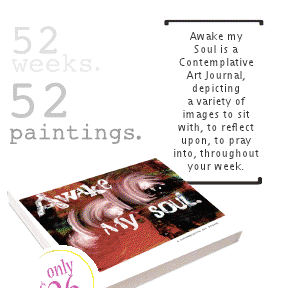 wake My Soul: A Contemplative Art Journal Aletheia Schmidt $25.99 Aletheia is a Lancaster, PA-based artist who has created this wonderful, full-color book which shows her abstract work with plenty of nice spaces for you to journal, reflect, or draw along. She is a vibrant, kind, and talented young woman and she sees these paintings as prayers. She believes “the arts, imagination, and creativity offer life.”
wake My Soul: A Contemplative Art Journal Aletheia Schmidt $25.99 Aletheia is a Lancaster, PA-based artist who has created this wonderful, full-color book which shows her abstract work with plenty of nice spaces for you to journal, reflect, or draw along. She is a vibrant, kind, and talented young woman and she sees these paintings as prayers. She believes “the arts, imagination, and creativity offer life.”  u4rtets artwork by Mako Fujimura, Bruce Herman, and Christopher Theofanidis, and others; inspired by T. S. Eliot $35.00 You might want to revisit my previous review of this splendid, remarkable book — superlatives elude me to tell you how good this is. Two stellar, respected, deeply Christian painters (Fujimura and Herman), and a classical musical composer (Theofanidis), collaborated to do these works, collated in this marvelous coffee-table paperback book, inspired by the famous poem Four Quartets by T. S. Eliot.
u4rtets artwork by Mako Fujimura, Bruce Herman, and Christopher Theofanidis, and others; inspired by T. S. Eliot $35.00 You might want to revisit my previous review of this splendid, remarkable book — superlatives elude me to tell you how good this is. Two stellar, respected, deeply Christian painters (Fujimura and Herman), and a classical musical composer (Theofanidis), collaborated to do these works, collated in this marvelous coffee-table paperback book, inspired by the famous poem Four Quartets by T. S. Eliot. 
 Heffner. Ken and his
Heffner. Ken and his  he Soul of Hip Hop: Rims, Timbs and a Cultural Theology Daniel White Hodge (IVP) $17.00 I’ve said this before, but this may be the very best book on hip hop culture and the amazing art form of rap. Hodge is an astute observer, knows the history of the style, and – thank goodness, for a book like this! – enjoys it. His presentation the first night of the Calvin Festival was riveting, bold and passionate, well beyond a surface look, engaged with the passion of a devotee and evangelist. He wanted us to get it, to appreciate the lyrical power and social themes of the prophetic imagination emerging from the often disenfranchised artists who have shaped this genre. This is radical, Biblical reflection, and his book deserves to be known, read, considered. Certainly if you know young adults who like hip hop you should tell them about this book. We have a few others, but this is the best. Kudos to Calvin for once again hosting this good brother.
he Soul of Hip Hop: Rims, Timbs and a Cultural Theology Daniel White Hodge (IVP) $17.00 I’ve said this before, but this may be the very best book on hip hop culture and the amazing art form of rap. Hodge is an astute observer, knows the history of the style, and – thank goodness, for a book like this! – enjoys it. His presentation the first night of the Calvin Festival was riveting, bold and passionate, well beyond a surface look, engaged with the passion of a devotee and evangelist. He wanted us to get it, to appreciate the lyrical power and social themes of the prophetic imagination emerging from the often disenfranchised artists who have shaped this genre. This is radical, Biblical reflection, and his book deserves to be known, read, considered. Certainly if you know young adults who like hip hop you should tell them about this book. We have a few others, but this is the best. Kudos to Calvin for once again hosting this good brother. in Boldly: A Field Guide for Grace Cathleen Falsini (Zondervan) $19.99 I adore this book and it was so wonderful hearing Ms Falsini again. It was, in fact, deeply moving – Beth and I fought back tears when she played “Born at the Right Time” from Paul Simon’s Rhythm of the Saints as she talked about adopting her son from Malawi. And I got choked up when she told about her travels with Bono while playing a post 9-11 live video version of one of the many U2 songs that helped so many of us cope after that tragedy. Falsani has
in Boldly: A Field Guide for Grace Cathleen Falsini (Zondervan) $19.99 I adore this book and it was so wonderful hearing Ms Falsini again. It was, in fact, deeply moving – Beth and I fought back tears when she played “Born at the Right Time” from Paul Simon’s Rhythm of the Saints as she talked about adopting her son from Malawi. And I got choked up when she told about her travels with Bono while playing a post 9-11 live video version of one of the many U2 songs that helped so many of us cope after that tragedy. Falsani has  ex, Drugs, and Cocoa Puffs: A Low Culture Manifesto Chuck Klosterman (Scribner) $15.00 Many participants adored this edgy, Gen X writer, one of the more popular novelists and essayists of his generation, as he rambled through a hip talk pondering what in the world he was doing at a conference on religion and rock music. Well, for starters, his novels are packed full of references to religion and music, and his collections of essays -fun, profane, pushy, witty, insightful – sometimes tackle the topic directly. (Chuck K is a sports writer, too, and his journalism there is also highly regarded among those who favor a certain informal, provocative style. In his talk he dismissed the recent pundit who compared him to Hunter S. Thompson but to even have to do that, well, ’nuff said.) Okay, so, anyway, he wondered how he got himself into this gig.
ex, Drugs, and Cocoa Puffs: A Low Culture Manifesto Chuck Klosterman (Scribner) $15.00 Many participants adored this edgy, Gen X writer, one of the more popular novelists and essayists of his generation, as he rambled through a hip talk pondering what in the world he was doing at a conference on religion and rock music. Well, for starters, his novels are packed full of references to religion and music, and his collections of essays -fun, profane, pushy, witty, insightful – sometimes tackle the topic directly. (Chuck K is a sports writer, too, and his journalism there is also highly regarded among those who favor a certain informal, provocative style. In his talk he dismissed the recent pundit who compared him to Hunter S. Thompson but to even have to do that, well, ’nuff said.) Okay, so, anyway, he wondered how he got himself into this gig. comes.
comes.  ight By Her Roots: Americana Women and Their Songs Jewly Hight (Baylor University Press) $24.95 I really intended to catch this workshop, but the schedule didn’t permit. So glad we have had the book on our shelves for a year. I’ve read a few of these good chapters (about Julie Miller, Victoria Williams, Michelle Shocked) and will now read more. One reviewer said when it came out that it “will end up being the best book written about American music this year” FFM speaker David Dark invites us to be enriched saying, “With a powerful wit, intense attentiveness, and eloquent empathy, Jewly Hight is a dream come true for the songwriters to whom she pays careful and affectionate heed. By calling our attention to them, she lifts their voices, testifying concerning the ways their work uplifts, invigorates, and challenges our otherwise all-too-settled imaginations.”
ight By Her Roots: Americana Women and Their Songs Jewly Hight (Baylor University Press) $24.95 I really intended to catch this workshop, but the schedule didn’t permit. So glad we have had the book on our shelves for a year. I’ve read a few of these good chapters (about Julie Miller, Victoria Williams, Michelle Shocked) and will now read more. One reviewer said when it came out that it “will end up being the best book written about American music this year” FFM speaker David Dark invites us to be enriched saying, “With a powerful wit, intense attentiveness, and eloquent empathy, Jewly Hight is a dream come true for the songwriters to whom she pays careful and affectionate heed. By calling our attention to them, she lifts their voices, testifying concerning the ways their work uplifts, invigorates, and challenges our otherwise all-too-settled imaginations.” veryday Apocalypse: The Sacred Revealed in Radiohead, the Simpsons, and other Pop Culture Icons David Dark (Brazos) $18.00 What can I say? Being with David is itself a bit of performance art; he’s a genius, a wordsmith, and a dear, dear, loyal friend to many. He has written several other books, all of which we commend (and, in fact, I’ve got an endorsing blurb on one of them, an honor I did not take lightly.) Pop culture fans young and old, artists, filmmakers, writers, and thought leaders in this whole arena (like FFM’s Ken Heffner) will regularly say that David Dark is one of their best supporters and his book truly seminal. No one can talking knowingly about this topic without having read Everyday Apocalypse; it is that important. If you are interested and into this topic and haven’t read this amazingly rich, mind-blowing work, treat yourself and be prepared to have your world rocked. Really.
veryday Apocalypse: The Sacred Revealed in Radiohead, the Simpsons, and other Pop Culture Icons David Dark (Brazos) $18.00 What can I say? Being with David is itself a bit of performance art; he’s a genius, a wordsmith, and a dear, dear, loyal friend to many. He has written several other books, all of which we commend (and, in fact, I’ve got an endorsing blurb on one of them, an honor I did not take lightly.) Pop culture fans young and old, artists, filmmakers, writers, and thought leaders in this whole arena (like FFM’s Ken Heffner) will regularly say that David Dark is one of their best supporters and his book truly seminal. No one can talking knowingly about this topic without having read Everyday Apocalypse; it is that important. If you are interested and into this topic and haven’t read this amazingly rich, mind-blowing work, treat yourself and be prepared to have your world rocked. Really. ersonal Jesus: How Popular Music Shapes Our Souls Clive Marsh & Vaughan S. Roberts (Baker Academic) $22.99 It was a delight to meet Vaughan (who gave an outstanding, research-based workshop) and to chat with some of his editorial staff at Baker who do so many good books in this series – what a fascinating gentleman scholar who is doing such fine work! Yes, this book is a bit academic (and yes, the cover is, uh, well, you know.) But at its heart is something basic, something passionate, something nearly primal: how does listening to music effect us? Is it a religious experience and if so, how? What do people say when asked? What is going on here? (And, is it the lyric, mostly, or the music itself?) This is a very serious, and I think groundbreaking rumination on how popular music works, the role it plays for listeners, and the phenomenon of its popularity. It really does have a missional edge, asking how we as Christians might engage the music itself, more faithfully, and with awareness of why we and our neighbors are influenced as we are by the music we love.
ersonal Jesus: How Popular Music Shapes Our Souls Clive Marsh & Vaughan S. Roberts (Baker Academic) $22.99 It was a delight to meet Vaughan (who gave an outstanding, research-based workshop) and to chat with some of his editorial staff at Baker who do so many good books in this series – what a fascinating gentleman scholar who is doing such fine work! Yes, this book is a bit academic (and yes, the cover is, uh, well, you know.) But at its heart is something basic, something passionate, something nearly primal: how does listening to music effect us? Is it a religious experience and if so, how? What do people say when asked? What is going on here? (And, is it the lyric, mostly, or the music itself?) This is a very serious, and I think groundbreaking rumination on how popular music works, the role it plays for listeners, and the phenomenon of its popularity. It really does have a missional edge, asking how we as Christians might engage the music itself, more faithfully, and with awareness of why we and our neighbors are influenced as we are by the music we love. roken Hallelujahs: Why Popular Music Matters to Those Seeking God Christian Scharen (Baker) $18.00 I love this book, and really appreciate the work of this excellent author. (Scharen used to be at the Center for Faith and Culture at Yale Divinity School, but now teaches worship and theology at Luther Seminary in St. Paul.) I’ve reviewed it before, so for how, here’s what it says on the back cover: “Building on the success of One Step Closer: Why U2 Matters to Those Seeking God, Christian Scharen shows how to engage faith and culture through a wide range of popular music, including the blues, hip-hop, and rock. He examines artists such as Arcade Fire, Kanye West, Leonard Cohen, and Billie Holiday, offering a fresh, compelling theology of culture in conversation with C. S. Lewis that can look suffering and brokenness in the face because it knows of a love deeper than hate, a hope stronger than despair. Written engagingly yet with theological depth, this book will resonate with readers interested in the interface between pop culture, music, and theology, as well as with pastors and youth ministers.”
roken Hallelujahs: Why Popular Music Matters to Those Seeking God Christian Scharen (Baker) $18.00 I love this book, and really appreciate the work of this excellent author. (Scharen used to be at the Center for Faith and Culture at Yale Divinity School, but now teaches worship and theology at Luther Seminary in St. Paul.) I’ve reviewed it before, so for how, here’s what it says on the back cover: “Building on the success of One Step Closer: Why U2 Matters to Those Seeking God, Christian Scharen shows how to engage faith and culture through a wide range of popular music, including the blues, hip-hop, and rock. He examines artists such as Arcade Fire, Kanye West, Leonard Cohen, and Billie Holiday, offering a fresh, compelling theology of culture in conversation with C. S. Lewis that can look suffering and brokenness in the face because it knows of a love deeper than hate, a hope stronger than despair. Written engagingly yet with theological depth, this book will resonate with readers interested in the interface between pop culture, music, and theology, as well as with pastors and youth ministers.” Robert K. Johnston, Craig Detweiler, and Barry Taylor (Westminster/John Knox) $20.00 I hope you know these authors, who form nearly an entire school of thought in this whole area of study. Each have written thoughtful books on film, music, entertainment, digital culture, media and the popular arts. Together, now, they’ve edited a fine collection of mature essays on hundreds and hundreds of topics. Don’t Stop… can be used as a conversation starter, as background for deeper thinking, or to dip in to whenever you have a spare moment or two (but be aware, it can be addicting!) Skip to pedestrian cover and dive right in — this is good, good content! Read succinct insights about the Beatles, the significance of Star Trek, the meaning of Dr. Who, making sense of South Park, the aesthetics of Andy Warhol, the role of Calvin Klein and Nike ads, the theological significance of SimCity.
Robert K. Johnston, Craig Detweiler, and Barry Taylor (Westminster/John Knox) $20.00 I hope you know these authors, who form nearly an entire school of thought in this whole area of study. Each have written thoughtful books on film, music, entertainment, digital culture, media and the popular arts. Together, now, they’ve edited a fine collection of mature essays on hundreds and hundreds of topics. Don’t Stop… can be used as a conversation starter, as background for deeper thinking, or to dip in to whenever you have a spare moment or two (but be aware, it can be addicting!) Skip to pedestrian cover and dive right in — this is good, good content! Read succinct insights about the Beatles, the significance of Star Trek, the meaning of Dr. Who, making sense of South Park, the aesthetics of Andy Warhol, the role of Calvin Klein and Nike ads, the theological significance of SimCity. he Day Metallica Came to Church: Searching for the Everywhere God in Everything John Van Sloten (Faith Alive/Square Inch) $14.99 Although the lead-off Metallica piece here really is a fine, fine essay, this isn’t a book about heavy metal music; it isn’t even a book about music in the church, really, at all. It is a book about popular culture, about how to find the presence of God — “the everywhere God” — in all sorts of places, artifacts, experiences. This is the kind of book you can enjoy by dipping in almost anywhere: a piece on No Country for Old Men, perhaps? “Common Grace in The Dark Knight“? A reflection on Van Gogh? Race relations explored Christianly by way of the movie Crash? Yes, yes, yes, you can enjoy these, use them in classes, ponder them so that you might deepen your own cultural discernment skills. John Van Sloten is my kind of guy — he loves U2, he is able to talk theology, and he exhibits a wide reading/listening/viewing pallet. And he’s mostly quite right about all this: as Richard Mouw writes, “Don’t go — or refuse to go! — to another rock concert or soccer match without first reading this marvelous book. It is a reliable and inspiring guide to hearing the Lord speak to us in new and exciting places.”
he Day Metallica Came to Church: Searching for the Everywhere God in Everything John Van Sloten (Faith Alive/Square Inch) $14.99 Although the lead-off Metallica piece here really is a fine, fine essay, this isn’t a book about heavy metal music; it isn’t even a book about music in the church, really, at all. It is a book about popular culture, about how to find the presence of God — “the everywhere God” — in all sorts of places, artifacts, experiences. This is the kind of book you can enjoy by dipping in almost anywhere: a piece on No Country for Old Men, perhaps? “Common Grace in The Dark Knight“? A reflection on Van Gogh? Race relations explored Christianly by way of the movie Crash? Yes, yes, yes, you can enjoy these, use them in classes, ponder them so that you might deepen your own cultural discernment skills. John Van Sloten is my kind of guy — he loves U2, he is able to talk theology, and he exhibits a wide reading/listening/viewing pallet. And he’s mostly quite right about all this: as Richard Mouw writes, “Don’t go — or refuse to go! — to another rock concert or soccer match without first reading this marvelous book. It is a reliable and inspiring guide to hearing the Lord speak to us in new and exciting places.” istening to Popular Music (Compass Guides to Christian Explorations of Daily Living) Don H. Compier (Augsburg) $15.00 I have commended this series of books before, and glad that they’ve now included this great topic alongside the others (such as Clothing, Shopping, Eating and Drinking, Play, Parenting, Work.) Compier could have presented a scholarly paper at the FFM, for sure, as his general effort is consistent with their discerning “common grace for the common good” project, and he takes up the gifts of pop music in thoughtful, faith-informed, sociologically-astute ways. His style at times, especially in a chapter about the fear of music in church history, illustrates his role as a theological thinker of mainline Protestant orientation. Still, this is a solid, interesting, brief, contribution to this whole project. Compier is dean and professor of theology at Community of Christ Seminary at Graceland University in Independence Missouri. Another book he wrote is What is Rhetorical Theology: Textual Practice and Public Discourse — this one, gladly, isn’t laden with that kind of arcane rhetoric. He does cite some fairly contemporary singers (Death Cab; Lady Gaga, Green Day, Rage Against the Machine) but as he explains, he’s been a rock and roll fan all of his boomer life. So he digs the the Beatles and Springsteen and Los Lobos and Aretha Franklin and Johnny Cash; even the Dead! And he writes about them alongside Augustine, Calvin, Wesley, and James Cone. No matter your musical tastes, he has given us some important, serious stuff, here, a method for thinking intentionally about popular arts. Like the others in the series, it is well worth reading.
istening to Popular Music (Compass Guides to Christian Explorations of Daily Living) Don H. Compier (Augsburg) $15.00 I have commended this series of books before, and glad that they’ve now included this great topic alongside the others (such as Clothing, Shopping, Eating and Drinking, Play, Parenting, Work.) Compier could have presented a scholarly paper at the FFM, for sure, as his general effort is consistent with their discerning “common grace for the common good” project, and he takes up the gifts of pop music in thoughtful, faith-informed, sociologically-astute ways. His style at times, especially in a chapter about the fear of music in church history, illustrates his role as a theological thinker of mainline Protestant orientation. Still, this is a solid, interesting, brief, contribution to this whole project. Compier is dean and professor of theology at Community of Christ Seminary at Graceland University in Independence Missouri. Another book he wrote is What is Rhetorical Theology: Textual Practice and Public Discourse — this one, gladly, isn’t laden with that kind of arcane rhetoric. He does cite some fairly contemporary singers (Death Cab; Lady Gaga, Green Day, Rage Against the Machine) but as he explains, he’s been a rock and roll fan all of his boomer life. So he digs the the Beatles and Springsteen and Los Lobos and Aretha Franklin and Johnny Cash; even the Dead! And he writes about them alongside Augustine, Calvin, Wesley, and James Cone. No matter your musical tastes, he has given us some important, serious stuff, here, a method for thinking intentionally about popular arts. Like the others in the series, it is well worth reading. opologetics: Popular Culture in Christian Perspective Ted Turnau (Presbyterian & Reformed) $19.99 If I had been selling books at this event, I’d have had this on a double-decker book stand, featured and promoted. In part, I’d do it just to be ornery, since this author calls us to be a bit more concerned about the possible negative influences of pop culture, and such “Christ against culture” themes (or, better, what Kuyper called “the antithesis”) isn’t discussed much at FFM. But I’d be being sincere, too, as this really is a great book, and those attending the conference surely would benefit from it. Despite the quirky title, Popologetics is a profound, serious, important, and — at times — exquisitely exciting study, inviting us to really dig deep into the “in the world but not of it” teaching of Jesus. Just so you know how very good this is, read
opologetics: Popular Culture in Christian Perspective Ted Turnau (Presbyterian & Reformed) $19.99 If I had been selling books at this event, I’d have had this on a double-decker book stand, featured and promoted. In part, I’d do it just to be ornery, since this author calls us to be a bit more concerned about the possible negative influences of pop culture, and such “Christ against culture” themes (or, better, what Kuyper called “the antithesis”) isn’t discussed much at FFM. But I’d be being sincere, too, as this really is a great book, and those attending the conference surely would benefit from it. Despite the quirky title, Popologetics is a profound, serious, important, and — at times — exquisitely exciting study, inviting us to really dig deep into the “in the world but not of it” teaching of Jesus. Just so you know how very good this is, read  yes Wide Open: Looking for God in Popular Culture William D. Romanowski (Brazos Press) $23.00 This is surely one of the best books in this field, doubtlessly a watershed work, esteemed and cited by everybody in the field. If you follow BookNotes or visit the shop, you may recall
yes Wide Open: Looking for God in Popular Culture William D. Romanowski (Brazos Press) $23.00 This is surely one of the best books in this field, doubtlessly a watershed work, esteemed and cited by everybody in the field. If you follow BookNotes or visit the shop, you may recall Books) $24.99 Not Yet Released; due late summer/early fall 2013 It is a bit early to promote this, perhaps, and you can be sure I’ll do a thorough discussion of it when it releases later this year. I’ve read much of it already in early drafts, and, like its earlier, spectacular, must-have companion volume, It Was Good: Making Art to the Glory of God (also edited by Bustard and published by Square Halo Books; $24.99 ) it is truly, exceptionally fantastic. There is no other volume like this, that’s for sure!
Books) $24.99 Not Yet Released; due late summer/early fall 2013 It is a bit early to promote this, perhaps, and you can be sure I’ll do a thorough discussion of it when it releases later this year. I’ve read much of it already in early drafts, and, like its earlier, spectacular, must-have companion volume, It Was Good: Making Art to the Glory of God (also edited by Bustard and published by Square Halo Books; $24.99 ) it is truly, exceptionally fantastic. There is no other volume like this, that’s for sure! 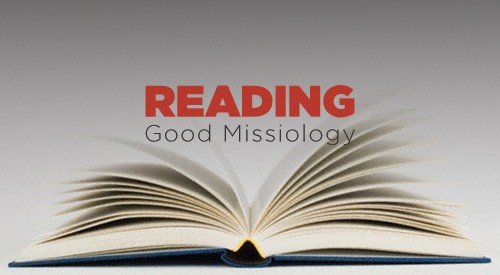 , Vocation and Culture. I tried to make the case that in the death and resurrection of Christ the “death of death” has been accomplished, which means not only that those in Christ are promised eternal life, but that God’s own rulership of the world is assured — the divine restoration of all things has begun! The brokenness and hurt of this fallen world is being healed! This in-breaking of the rescue plan of the world God so loves means we have to learn how to live as new creations in a new world coming; a Christ-centered commonwealth called in the Bible the Kingdom of God, into which we are transplanted. Being savingly liberated from the bondage of the old order is, of course, only the start of the Christian journey and we are now tasked with discerning the shape and texture of Christian discipleship in our place, in our time.
, Vocation and Culture. I tried to make the case that in the death and resurrection of Christ the “death of death” has been accomplished, which means not only that those in Christ are promised eternal life, but that God’s own rulership of the world is assured — the divine restoration of all things has begun! The brokenness and hurt of this fallen world is being healed! This in-breaking of the rescue plan of the world God so loves means we have to learn how to live as new creations in a new world coming; a Christ-centered commonwealth called in the Bible the Kingdom of God, into which we are transplanted. Being savingly liberated from the bondage of the old order is, of course, only the start of the Christian journey and we are now tasked with discerning the shape and texture of Christian discipleship in our place, in our time.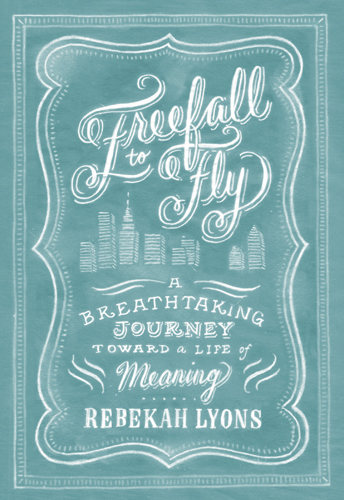 reefall to Fly: A Breathtaking Journey Toward a Life of Meaning Rebekah Lyons (Tyndale) $19.99
reefall to Fly: A Breathtaking Journey Toward a Life of Meaning Rebekah Lyons (Tyndale) $19.99 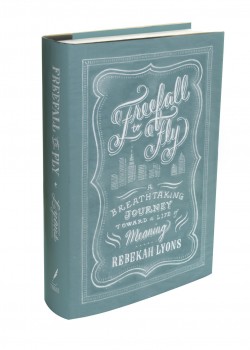
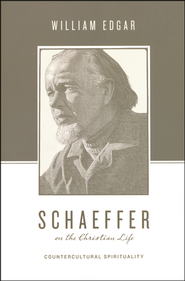 chaeffer on the Christian Life: Countercultural Spirituality William Edgar (Crossway) $17.99 There are other biographies of Francis Schaeffer and of course he and the late Edith Schaeffer have between them nearly 50 books of their own. With Edith’s passing last week, many have written on-line tributes. (At the Hearts & Minds bookstore’s facebook page I even told a brief, fun story of how Edith held and comforted our daughter Stephanie — and us — when Steph was an infant.) Now is an excellent time to reconsider the impact of the Schaeffers and this new book is the place to begin.
chaeffer on the Christian Life: Countercultural Spirituality William Edgar (Crossway) $17.99 There are other biographies of Francis Schaeffer and of course he and the late Edith Schaeffer have between them nearly 50 books of their own. With Edith’s passing last week, many have written on-line tributes. (At the Hearts & Minds bookstore’s facebook page I even told a brief, fun story of how Edith held and comforted our daughter Stephanie — and us — when Steph was an infant.) Now is an excellent time to reconsider the impact of the Schaeffers and this new book is the place to begin. 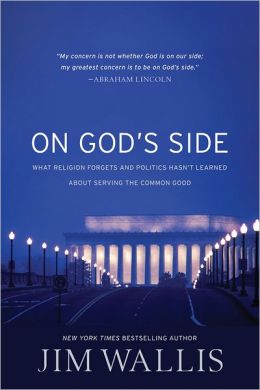 n God’s Side: What Religion Forgets and Politics Hasn’t Learned About Serving the Common Good Jim Wallis (Brazos Press) $21.99 I think Jim may have been the first nationally-known author we had in our little shop maybe 25 years ago. I am proud to say I read Sojourners magazine in college when it was still called Post-American — a housemate even had a Post-American cover with a picture of Thomas Merton taped to our bedroom wall. And I have read all of Jim’s writings; The Call to Conversion remains one of my all-time favorite books. He may not be my favorite public theologian, necessarily; I am not the only Sojo fan who finds some of their important work less than fully adequate at times. Still, as I insist even to those who don’t like his left-leaning tendencies, Wallis is a good writer, makes tons of sense, and is more balanced and careful than many who mostly traffic in slogans and clichés on the far left or right. So, I really, really think we should read and engage his contributions to our on-going efforts to discern a Biblically-faithful public witness in our post-Christian, pluralistic and woefully polarized culture. We have promoted each of his books over the years, and are especially excited about this one.
n God’s Side: What Religion Forgets and Politics Hasn’t Learned About Serving the Common Good Jim Wallis (Brazos Press) $21.99 I think Jim may have been the first nationally-known author we had in our little shop maybe 25 years ago. I am proud to say I read Sojourners magazine in college when it was still called Post-American — a housemate even had a Post-American cover with a picture of Thomas Merton taped to our bedroom wall. And I have read all of Jim’s writings; The Call to Conversion remains one of my all-time favorite books. He may not be my favorite public theologian, necessarily; I am not the only Sojo fan who finds some of their important work less than fully adequate at times. Still, as I insist even to those who don’t like his left-leaning tendencies, Wallis is a good writer, makes tons of sense, and is more balanced and careful than many who mostly traffic in slogans and clichés on the far left or right. So, I really, really think we should read and engage his contributions to our on-going efforts to discern a Biblically-faithful public witness in our post-Christian, pluralistic and woefully polarized culture. We have promoted each of his books over the years, and are especially excited about this one. Baltimore at the
Baltimore at the 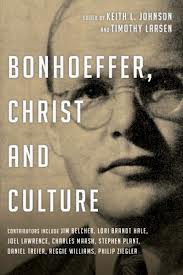 onhoeffer, Christ and Culture edited by Keith Johnson & Timothy Larsen (IVP Academic) $20.00 Every year, Wheaton College hosts a top-drawer, extraordinary theology conference and this new book gathers together the excellent papers which were presented at the 2012 event. Although most of the presenters self-identify as evangelicals, not all do, making this a very interesting, provocative, and delightfully multi-vocal anthology. A few of the chapters are thrilling to me (one great one was on how evangelicals, particularly, have engaged Bonhoeffer – from curiously positive Moody Monthly articles in the mid-60s to Cornelius Van Til’s philosophical criticisms, to the nearly superstar status of Eric Metaxas’ important 2011 biography, Bonhoeffer: Pastor, Martyr Prophet, Spy.) One chapter is exquisitely moving, as Jim Belcher narrates a trip to several Bonhoeffer sites in Germany. Charles Marsh is here writing on grace; Stephen Plant on politics, Joel Lawrence gives a powerful chapter on being “a church for others.” Daniel Treier has a fascinating chapter using Bonhoeffer to help us navigate modernity and its machines. Reggie Williams offers a fabulous piece on Bonhoeffer’s time amidst the Harlem Renaissance (which is, by the way, a tremendous, tremendous chapter on a topic that most of us could stand to learn more about.) Lutheran professor Lori Brandt Hale, co-author of the great little Bonhoeffer for Armchair Theologians (Westminster/John Knox; $17.00) offers a very helpful chapter on Bonhoeffer’s teachings about vocation.
onhoeffer, Christ and Culture edited by Keith Johnson & Timothy Larsen (IVP Academic) $20.00 Every year, Wheaton College hosts a top-drawer, extraordinary theology conference and this new book gathers together the excellent papers which were presented at the 2012 event. Although most of the presenters self-identify as evangelicals, not all do, making this a very interesting, provocative, and delightfully multi-vocal anthology. A few of the chapters are thrilling to me (one great one was on how evangelicals, particularly, have engaged Bonhoeffer – from curiously positive Moody Monthly articles in the mid-60s to Cornelius Van Til’s philosophical criticisms, to the nearly superstar status of Eric Metaxas’ important 2011 biography, Bonhoeffer: Pastor, Martyr Prophet, Spy.) One chapter is exquisitely moving, as Jim Belcher narrates a trip to several Bonhoeffer sites in Germany. Charles Marsh is here writing on grace; Stephen Plant on politics, Joel Lawrence gives a powerful chapter on being “a church for others.” Daniel Treier has a fascinating chapter using Bonhoeffer to help us navigate modernity and its machines. Reggie Williams offers a fabulous piece on Bonhoeffer’s time amidst the Harlem Renaissance (which is, by the way, a tremendous, tremendous chapter on a topic that most of us could stand to learn more about.) Lutheran professor Lori Brandt Hale, co-author of the great little Bonhoeffer for Armchair Theologians (Westminster/John Knox; $17.00) offers a very helpful chapter on Bonhoeffer’s teachings about vocation. 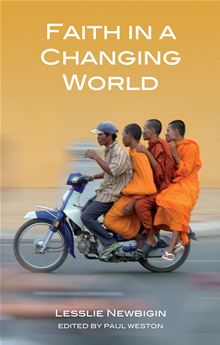 aith in a Changing World Lesslie Newbigin edited by Paul Weston (St. Paul’s Theology Centre) $12.99 Just when you thought you had known of everything in print by the famous missionary to India, here comes a wonderful newly edited volume including two of his important, but long out-of-print (British) books in one nice paperback. Included here are two of Newbigin’s classic works, Discovering Hope in a Changing World and Living Hope in a Changing World. As it says on the back cover, “Together, they present the Christian story as a lens through which to view and understand God and the world, demonstrating that Christianity is a viable way to live one’s life today, and that Christians need not retreat to a private world where faith is presumed to be ‘mere opinion.'”
aith in a Changing World Lesslie Newbigin edited by Paul Weston (St. Paul’s Theology Centre) $12.99 Just when you thought you had known of everything in print by the famous missionary to India, here comes a wonderful newly edited volume including two of his important, but long out-of-print (British) books in one nice paperback. Included here are two of Newbigin’s classic works, Discovering Hope in a Changing World and Living Hope in a Changing World. As it says on the back cover, “Together, they present the Christian story as a lens through which to view and understand God and the world, demonstrating that Christianity is a viable way to live one’s life today, and that Christians need not retreat to a private world where faith is presumed to be ‘mere opinion.'” 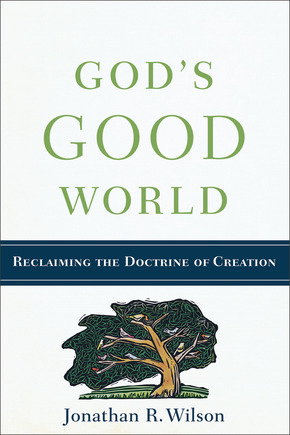 od’s Good World: Reclaiming the Doctrine of Creation Jonathan R. Wilson (Baker Academic) $24.99 I have been waiting for a book like this for years, and am so very happy this has arrived. Our best theologians have reminded us that to fully understand Christ’s work of redemption and the very nature of God’s Kingdom we must start – as the Biblical narrative itself does – with the doctrine of creation. This world of original blessing, what Calvin called “the theater of God,” is the location, the context, the setting, the focus, of God’s redemption. The whole creation groans, Romans 8 tells us, awaiting humans (the original caretakers of creation) to be reconciled with their Creator; in Christ (the second Adam) we can again take up our task to image God in the world of God’s good creation. Any fruitful exploration of faith and discipleship that missed this given context of our lives will be, at best, inadequate and, worse, woefully distorted — gnostic, quietistic, weird.
od’s Good World: Reclaiming the Doctrine of Creation Jonathan R. Wilson (Baker Academic) $24.99 I have been waiting for a book like this for years, and am so very happy this has arrived. Our best theologians have reminded us that to fully understand Christ’s work of redemption and the very nature of God’s Kingdom we must start – as the Biblical narrative itself does – with the doctrine of creation. This world of original blessing, what Calvin called “the theater of God,” is the location, the context, the setting, the focus, of God’s redemption. The whole creation groans, Romans 8 tells us, awaiting humans (the original caretakers of creation) to be reconciled with their Creator; in Christ (the second Adam) we can again take up our task to image God in the world of God’s good creation. Any fruitful exploration of faith and discipleship that missed this given context of our lives will be, at best, inadequate and, worse, woefully distorted — gnostic, quietistic, weird.